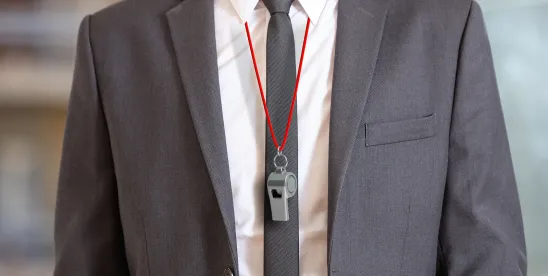Newly effective amendments to the Illinois Whistleblower Act (“IWA”) provide greatly enhanced protections and remedies to Illinois employees who report unlawful conduct by their employers. The IWA protects both private and government employees who report information that they believe violates the law, or who refuse to participate in an activity that they believe violates the law.[1] However, until January 1, 2025, the IWA required that employees report the alleged misconduct to an external government body. As revised, the IWA now protects internal whistleblower reports as well. The IWA amendments also create a more employee-friendly standard for demonstrating that the whistleblower believed that unlawful conduct was occurring and expand the remedies available for violations of the statute. Taken together, the changes detailed below bring Illinois law in line with some of the broadest federal and state-level whistleblower protections, including the Sarbanes-Oxley Act of 2022 (“SOX”) and the Consumer Financial Protection Act (“CFPA”), both of which apply to disclosures made internally to the employer. Illinois also now mirrors several states that similarly provide whistleblower protection for internal disclosures, including New York, Minnesota, New Jersey, Virginia, and California.
Protecting Internal Disclosures
Prior to the amendment, which Governor JB Pritzker approved on August 9, 2024, an employee’s report of suspected misconduct to a supervisor was insufficient to gain protection under the IWA because whistleblowers had to report to external government authorities. For example, in 2020, an Illinois district court in Beasley v. City of Granite City held the IWA did not apply to a city police dispatcher’s internal report.[2] In that case, the dispatcher suffered retaliation by her captain after she helped her supervising lieutenant bring his own case against the captain. The court held that the dispatcher failed to state a claim under the IWA because she disclosed the retaliation only to the supervising lieutenant instead of “to a court, in any other proceeding, or to a government or law enforcement agency. ”[3] Although the dispatcher attempted to publicly disclose the wrongdoing via the lieutenant’s court proceeding against the captain, the court rejected such indirect reporting as insufficient under the IWA.[4]
Now, as of January 1, 2025, whistleblowers in Illinois will be protected for making internal disclosures.[5] Under the amended law, employers are prohibited from taking “retaliatory action” against an employee for disclosing or threatening to disclose information about the employer to any supervisor, principal officer, board member, or supervisor. [6] Importantly, “retaliatory action” includes an actual or threatened adverse employment action that would dissuade a reasonable worker from coming forward, or “any non-employment action that would dissuade a reasonable worker from disclosing information[.]” Adverse actions include, but are not limited to, firing, demotion, wage reduction, denying promotions, discipline, and threats. Retaliatory actions include, but are not limited to, the actual or threatened intentional interference with the ability to obtain future or former employment, and actual or threatened action related to interference with one’s immigration status.[7]
More Whistleblower-Friendly “Good Faith” Standard for Protected Activity
In addition to the protection for internal disclosures, the amended IWA also modifies the standard for whistleblower knowledge from requiring a “reasonable cause” to believe that the employer violated the law, to a “good faith” belief that the employer violated the law or posed a danger to the public. Although Illinois courts have not yet had an opportunity to define the “good faith belief” requirement, it may be easier for employees to bring a whistleblower claim as compared to SOX, which only covers employees who have a “reasonable belief” based on both an employee’s subjective and objective beliefs. Generally, good faith is considered to refer to honest dealing or a legitimate intent behind a person’s actions. For example, Illinois defines “good faith” in an unrelated statue as “honestly in fact in the conduct of the transaction.”[8] If the reporting employee must only show that they had an honest belief that their employer’s conduct violated law or policy or was a threat to public health or safety, employees may have an easier time meeting their initial burden.
Broader Remedies
Finally, the amended IWA increases the scope of potential penalties available against violating entities. The IWA now contains a criminal misdemeanor penalty and additional civil penalties including permanent or preliminary injunctive relief, back pay with interest, front pay, liquidated damages up to $10,000, compensation for litigation costs, and a civil penalty of $10,000 payable to the employee.[9] In addition to the private right of action, the amendment also allows for enforcement by the Attorney General.[10]
Put together, these amendments to the IWA greatly increase the range of protections for whistleblowers who report misconduct internally within their employer. Under the new statutory scheme, the police dispatcher in Beasley would have likely survived dismissal because she experienced retaliation in the form of threats, denial of comp time, and suspension after she reported misconduct within the organization to her supervisor. The amended IWA will provide employees in Illinois with the important opportunity to take advantage of whistleblower protections at the state level.
***
[1] See 740 ILCS § 174/15; see also Whistleblower Retaliation, available at https://katzbanks.com/practice-areas/whistleblower-law/.
[2] Beasley v. City of Granite City, 442 F. Supp. 3d 1066, 1072-73 (S.D. Ill. 2020).
[3] Id. at 1073.
[4] Id. at 1074.
[5] The new rules under the IWA only apply proactively.
[6] 740 ILCS § 174/15(c).
[7] 740 ILCS § 174/5
[8] Ill. Admin. Code tit. 38, § 1050.1250
[9] 740 ILCS § 174/25, 30.
[10] 740 ILCS § 174/31.



 />i
/>i
